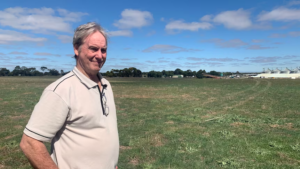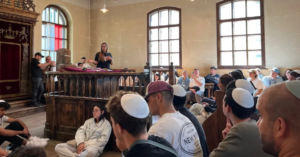TOPEKA — Michael Bell was homeless when he was diagnosed with heart disease and breathing issues in 2018.
In just a six-month stay at the Topeka Rescue Mission, he visited the hospital five times with pneumonia, congestive heart failure and sepsis.
YWCA Northeast Kansas is bringing attention to people like Bell who struggle with disabilities during the first week of its Racial Justice Challenge, a month-long series of online resources focusing on different topics affecting minorities. Kansas Reflector is a community partner in the challenge.
“It’s just vitally important that we continue to engage the community on these issues,” Bell said. “There are issues that I’m still not sure that people are fully aware of, or fully understand the importance of them. … People have to be reminded constantly that they’re only one or two steps away from being in these situations themselves.”
The YWCA kicked off its challenge with a panel discussion Thursday at the Topeka and Shawnee County Public Library in order to introduce the month’s topics and talk about the importance of being aware of the others who may be dealing with struggles like disabilities, especially when the person is of a minority group. In the coming weeks, the challenge will examine housing, music and mental health.
Phelica Glass, a therapist and social worker in Topeka, said people tend to walk around with blinders on and avoid seeing negative situations.
“We have to want to come to a place where we humanize everybody — like we value every single person in our community,” Glass said. “When we value every person in our community, we desire that they have the same access that I have. We desire that they have mobility the way that I do.”
Bell, president of the Tennessee Town Neighborhood Improvement Association, had his first heart episode in 2001 at the age of 37, and breathing started becoming difficult in 2013.
“It was 2018, though, when I had my heart, kidneys and lungs all began to shut down,” Bell said. “They told me at Stormont Vail that the readings that they saw for my kidney function they had not seen before. That’s how bad it was. I was close to dying.”
It was during this time that Bell realized his physical movement would never be the same. He now largely stays at home because of his disability, and said things like catching his breath upon entering a building can be difficult.
“In some situations where there’s handicapped parking marked, it’s still quite a trip to get from parking spaces into buildings,” Bell said. “And then once you get to buildings, you have to navigate that — no wheelchairs once you get into the buildings to ease, you know, that trip from your car to wherever you’re headed within that building.”
Struggles disabled individuals face can often go unseen by able-bodied people, which is one reason why Bell’s transparency and positive attitude is important, said Tara Wallace, a therapist who does advocacy work for the YWCA.
“I don’t know if he knows this, but it’s encouraging to so many people that he is willing to speak up, simply because a lot of people don’t,” Wallace said. “And a lot of people just allow whatever comes at them to be the way things are and they just accept it. He doesn’t, and I appreciate that because nothing’s going to change unless someone says something.”
Through his work, Bell improves Topeka neighborhoods by helping to combat crime and safety issues, physical and mental challenges, and the housing crisis.
“I’ve always been other-centered in my life, you know, always trying to help other people and especially those people that have been marginalized, and excluded, and disaffected and disenfranchised,” Bell said. “And, you know, part of that comes from my racial heritage, but it also comes from being low income for most of my life.”
Bell said he has a personal stake in the YWCA mission, being on a fixed income because of his disability, and the platform the organization provides is a great way to facilitate conversation.
“Everybody has to find time to get involved in their communities, even if it’s just an hour or two a week,” Bell said. “Find something you’re passionate about, get out there, support what they’re doing, because if that does not happen, then nothing changes.”




